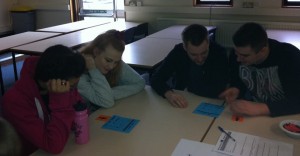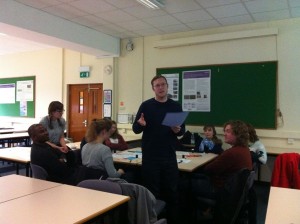This term, students taking the ‘Resilience for Sustainable Development’ Geography module participated in a stakeholder role play activity, to understand how multi-stakeholder decision-making processes are used to establish conservation goals. The purpose of the activity was to demonstrate the complexities and politics inherent in stakeholder deliberation processes. The activity used the specific example of standard-setting in the Roundtable on Sustainable Palm Oil (RSPO) production certification standard. The RSPO is a multi-stakeholder initiative in which business and civil society actors are integrated into the governance process to address the negative social, environmental and economic impacts of palm oil production on a transnational scale.
Students took on the roles of different stakeholders, including international environmental NGOs, large palm oil companies, smallholder producers, and retailers. A hypothetical scenario was given, that these stakeholders were taking part in the revision of the RSPO standard. This scenario was adapted to the lecture room using a “debating class” format. A conservation requirement, which would need to be followed by plantation companies, was proposed by the convener (who represented the RSPO Secretariat).
Firstly, groups were required to construct key arguments to convey how they wanted to shape the standard. They needed to consider the interests and strategic positions of the stakeholders they represented. Speaking to the individual groups, the NGO group considered whether they represented NGOs who lobbied companies, or worked with companies in a more collaborative way. They recognized the trade-off that exists between how stringent standards are, and implementation of the standards’ requirements by companies. The large companies were content with the vague standard as it allowed them to define their own version of what constitutes sustainability, and the retailers had varying views of how strict the standard should be. These varying views demonstrate the heterogeneity of interests, values and within stakeholder groups. The group representing smallholder farmers felt that their voices and power were weakest out of the stakeholder groups.
The second part of the task involved the groups debating their positions in the wider group setting. The retailers wanted to demonstrate Corporate Social Responsibility commitments to their customers, so pushed for the standard to be tightened, to reduce reputational risk. The smallholders called for financial support from plantation companies to support their conservation efforts. They also called for more options, to allow them to diversify their income and limit the impacts of monoculture cropping. NGOs showed a willingness of compromise, they encouraged more detail in the standard but were cognizant of the potential barriers this would impose for companies to adopt or comply with the RSPO’s requirements. The large companies were willing to absorb some of the costs, support the smallholders in some of their demands, but also make minimal changes to their operating procedures so not to stray too far from “business as usual.”
Following the larger debate, the group went on to reflect on what they learnt from different actors’ perspectives, and whether they agreed or disagreed with other stakeholders’ perspectives. They considered what can be learnt about stakeholder processes from undertaking this activity, and also raised questions about the challenges associated with such processes. These included: (i) Multi-stakeholder processes are complex and political, they take time and effort; (ii) Can the term ‘stakeholder’ be used to categorize such heterogeneous groups? Is it representative?; (iii) The more powerful voices will be heard, and the perhaps the voices that “better fit” with the design of the multi-stakeholder process; (iv) Compromise and consensus are needed, but this is not necessarily the most appropriate option for sustainability; (v) Some important stakeholders are excluded from the processes (the group identified these as being governments, and consumers), and some stakeholder groups are under-represented e.g. NGOs from developing countries, (vi) Implementation of requirements is crucial, highlighting the need for effective enforcement mechanisms or sanctions for non-conformance.
When taking on the roles of various stakeholders involved in the RSPO’s standard-setting processes, students expressed divergent views and interests, demonstrating the intrinsic politics of deliberative multi-stakeholder processes. Students conveyed the complexities of understanding the effectiveness of multi-stakeholder initiatives as an emerging governance mechanism.





